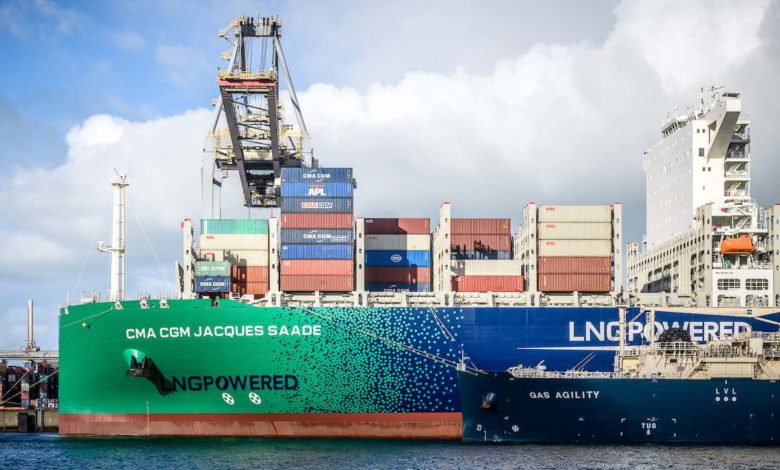IPCC report takes aim at methane creating further alarm for proponents of LNG-fuelled ships

The Intergovernmental Panel on Climate Change (IPCC) released a report yesterday warning that over the next 20 years, global temperatures are expected to reach or exceed 1.5°C of warming – meaning we can anticipate increasing heat waves, longer warm seasons, and intensifying rain and floods. Placed high up in the firing line of the influential report is the harmful effects methane is having on the planet, something that ought to make the many shipowners who have opted for LNG-fuelled newbuilds shudder.
“This report is a reality check,” IPCC working group co-chair Valérie Masson-Delmotte said.
Adopted in 2015, the Paris agreement has aimed to limit global warming to well below 2.0°C – preferring the target of 1.5°C. However, the IPCC report projects the earth will reach 1.5°C of global warming halfway through 2034.
Around 0.3C of the 1.1C that the world has already warmed by comes from methane
“Stabilising the climate will require strong, rapid, and sustained reductions in greenhouse gas emissions, and reaching net zero CO2 emissions,” IPCC working group co-chair Panmao Zhai said, adding: “Limiting other greenhouse gases and air pollutants, especially methane, could have benefits both for health and the climate.”
The report has a strong focus on methane, something that is emitted from LNG-powered vessels and by energy majors in creating LNG. The role of methane, aerosols and other short-lived climate pollutants had not been discussed by the IPCC until this week and is now set to get much of the attention that CO2 has had in recent decades.
According to the IPCC, around 0.3C of the 1.1C that the world has already warmed by comes from methane.
The report puts “a lot of pressure on the world to step up its game on methane,” said IPCC report reviewer Durwood Zaelke, president of the Institute for Governance and Sustainable Development in Washington, DC.
“Cutting methane is the single biggest and fastest strategy for slowing down warming,” Zaelke said.
In April this year the World Bank issued a report on decarbonising maritime transport in which it specifically recommended countries pull back from investing in further LNG bunkering infrastructure.
Taking a swipe at LNG as a fuel, the bank recommended that countries should avoid new public policy that supports LNG as a bunker fuel, reconsider existing policy support, and continue to regulate methane emissions.
“LNG is effectively liquefied methane, and methane is itself a highly potent GHG. Over 20-year and 100-year time horizons, methane is respectively 86 times and 36 times more potent a GHG than CO2. Therefore, any GHG emissions from unburnt methane released to the atmosphere – called methane leakage – can diminish or even entirely offset the theoretical GHG benefit of the use of LNG,” the bank warned.
Keen to dismiss the methane leakage argument, two LNG bunker lobby groups revealed details in April of an independent, peer-reviewed study that claims GHG reductions of up to 23% are achievable now from using LNG as a marine fuel, depending on the marine technology employed. This is compared with the emissions of current oil-based marine fuels measured from well-to-wake .
This report used the latest primary data to assess all major types of marine engines and global sources of supply with data provided by original equipment manufacturers including Caterpillar MaK, Caterpillar Solar Turbines, GE, MAN Energy Solutions, Rolls Royce (MTU), Wärtsilä, and Winterthur Gas & Diesel, as well as from ExxonMobil, Shell, and Total on the supply side. Methane emissions from the supply chains as well as methane released during the onboard combustion process – also known as methane slip – have been included in the analysis.
Peter Keller, chairman of lobby group SEA-LNG, commented at the time of the report’s release: “Often based on outdated data, methane slip has become an overused argument for those wishing to justify inaction.”
The study claims that by 2030 methane slip will have been “virtually eliminated” as technological improvements continue.
In gt terms, 28.4% of the global ship orde book is for LNG fuel capable tonnage, according to the latest data from Clarkson Research Services.

So the IPCC mountain has rumbled and given forth a nearly unreadable and confused report. I plodded on with this and got to page 60 before giving up again . I see it as another door stop. JLB would have ripped into this big time.
This report is very poorly written, confusing, excessively complex and has some major deficiencies. No doubt the green brigade will be using it as “evidence” to consign us all to long term misery. The whole thing is taking on the appearance of the situation centred on the earth centric universe which was agreed upon by the great and good until one Galileo torpedoed the whole rotten orthodox concept. Much good it did him but the truth will out.
The whole thing is taking on the appearance of a growth industry for R&D climate science interests and associated funding positions. The media and political types seem to be quite willing to condemn earlier achievements in industry and commerce as evil but they have been beneficiaries of this until now. Conversions on the road to Domestos??
Methane is a naturally produced world wide product from vegetation decomposition. Carbon was fingered in the past as the primary cause of climate change. Methane and aerosols now seem to be in the firing line
Carbon dioxide (derived from fossil fuel combustion) is still the main driver of climate change, where did you find anything different in your sixty page read? Methane has always been known to be a potent greenhouse, especially on short time spans. Nothing has changed in terms of scientific knowledge. What has changed is that there is now a greater sense of urgency, and tackling methane emissions harder may give greater benefits in the short term.
If the original report is too hard for you to understand, I suggest you to follow more divulgative sites, such as skeptical science.com.